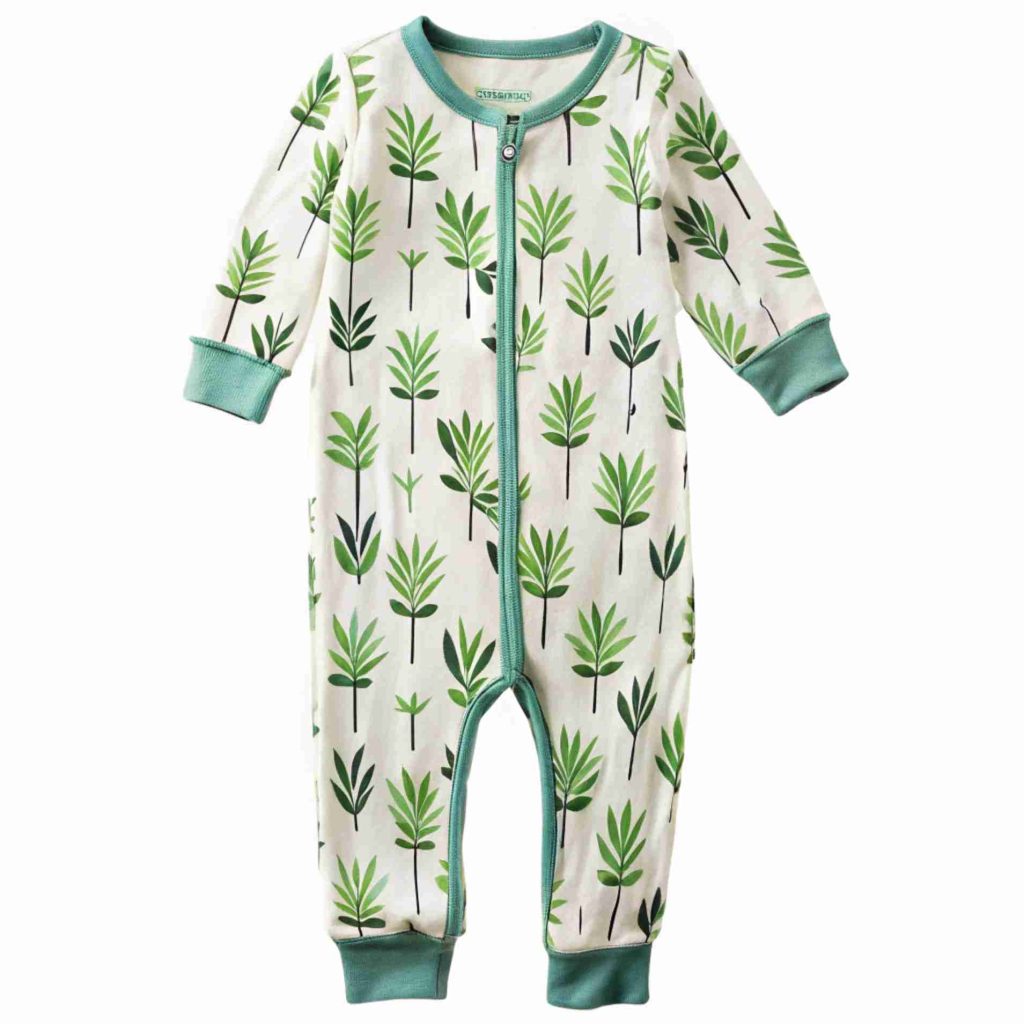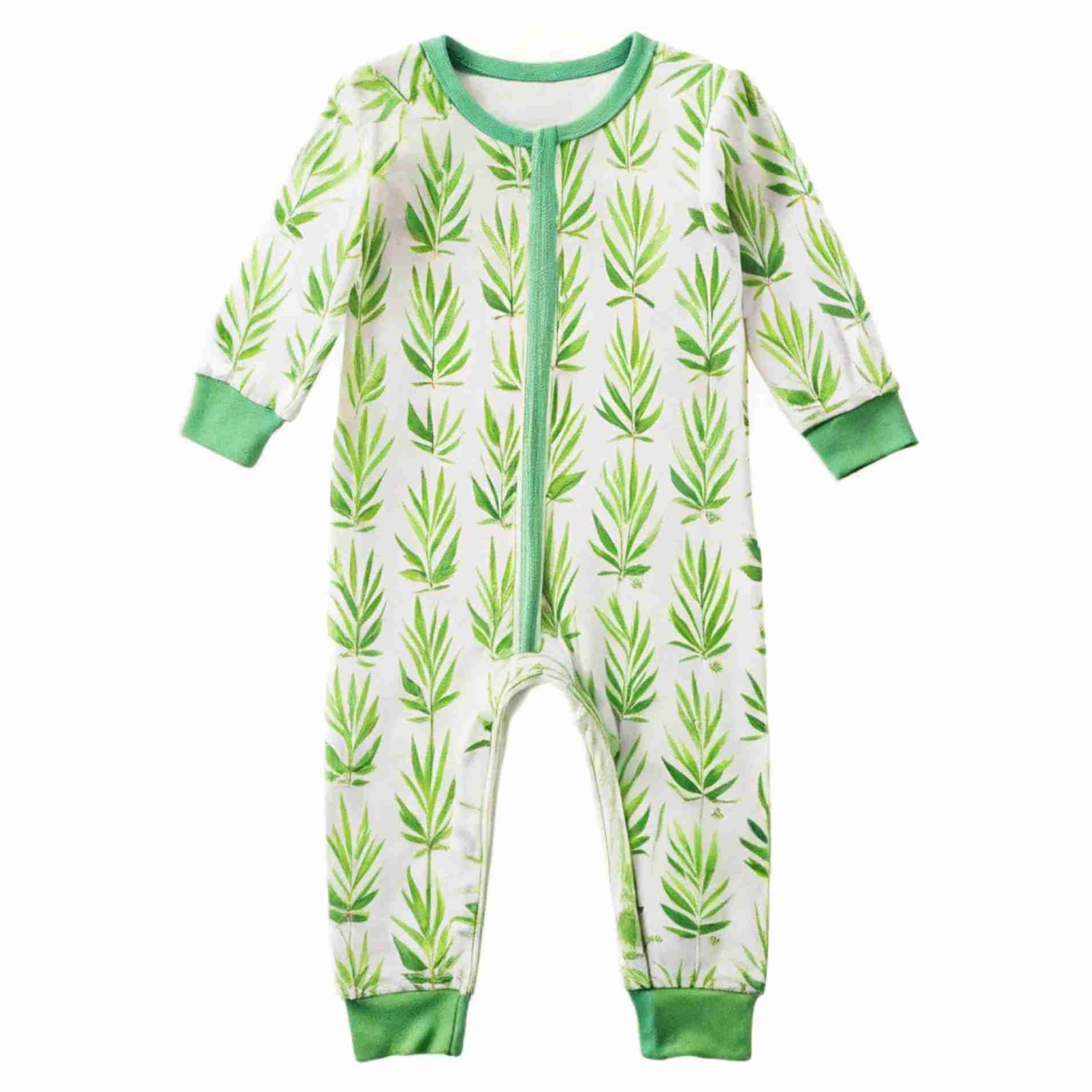Choosing the right pajamas for your baby is crucial. You want comfort, safety, and sustainability. Bamboo baby pajamas offer these benefits and more. They are popular among eco-conscious parents who prioritize their child’s well-being and the environment. This comprehensive guide will explore the many advantages of bamboo pajamas and provide a detailed comparison with other materials like cotton. We will also include real user reviews and testimonials, care instructions for maintaining bamboo pajamas, information on where to find the most sustainable options, and an engaging infographic to make the information more digestible.
Why Choose Bamboo Baby Pajamas?
Bamboo is a unique material that offers several benefits for baby pajamas. Firstly, bamboo fabric is incredibly soft, making it gentle on your baby’s delicate skin. The natural fibers of bamboo create a silky-smooth texture that provides optimal comfort for your little one. Additionally, bamboo is highly breathable, allowing air to circulate and regulate your baby’s body temperature, keeping them cool in hot weather and warm in colder seasons. This natural breathability helps prevent overheating and ensures your baby a comfortable and peaceful sleep.
Another significant advantage of bamboo baby pajamas is their hypoallergenic properties. Babies have sensitive skin and are more prone to skin irritations and allergies. Bamboo fabric is naturally hypoallergenic, making it an excellent choice for babies with sensitive skin. It is free from harsh chemicals and irritants, reducing the risk of skin reactions. This is particularly beneficial for babies with eczema or other skin conditions.
Environmental Impact of Bamboo vs. Cotton
When comparing bamboo and cotton, it is essential to consider their environmental impact. Cotton farming often involves using harmful pesticides and chemicals that can adversely affect the environment and human health. On the other hand, bamboo is a highly sustainable and eco-friendly material.
Bamboo is known for its fast growth and minimal resource requirements. It is one of the fastest-growing plants on Earth, capable of growing up to three feet in just one day. This rapid growth allows bamboo to be harvested more frequently than other plants, making it a highly sustainable choice. Additionally, bamboo requires significantly less water compared to cotton. According to a study published in the Journal of Cleaner Production, bamboo cultivation can use 60% less water than cotton farming. This makes bamboo a more environmentally friendly option for baby pajamas.
| Material | Water Usage | Pesticide Use | Growth Rate |
| Bamboo | 60% less than cotton | None | 3 feet/day |
| Cotton | High | High | Varies |
By choosing bamboo baby pajamas, you consciously reduce your environmental footprint and contribute to a more sustainable future for your child.
User Reviews and Testimonials
User experiences and testimonials can significantly influence purchasing decisions, especially regarding baby products. Hearing from other parents who have tried and tested bamboo baby pajamas can provide valuable insights and build trust with potential buyers.
Many parents rave about the softness and comfort of bamboo baby pajamas. Sarah from California said, “These pajamas are incredibly soft, and my baby sleeps better in them.” Another parent, Mike from Texas, noted, “I love that they are eco-friendly. It feels great to make a sustainable choice for my child.” These testimonials highlight parents’ positive experiences with bamboo baby pajamas and the peace of mind that comes from choosing a sustainable option for their little ones.
Care Instructions for Bamboo Baby Pajamas
To ensure the longevity and optimal performance of your bamboo baby pajamas, it is essential to follow specific care instructions. Here are some essential tips to help you maintain your bamboo pajamas:
- Wash in Cold Water: Bamboo pajamas should be washed in cold water using a gentle cycle. This helps prevent shrinkage and maintains the fabric’s softness.
- Avoid Bleach: Bleach can damage the natural fibers of bamboo and reduce the overall quality and softness of the fabric. It is best to avoid using bleach when washing bamboo baby pajamas.
- Air Dry: Whenever possible, hang your bamboo pajamas to dry. Air drying helps preserve the integrity of the fabric and prevents potential damage from high heat in the dryer.
- Iron on Low Heat: If ironing is necessary, use a low heat setting to prevent damage to the bamboo fabric. High temperatures can cause the fibers to weaken or scorch.
By following these care instructions, you can ensure that your bamboo baby pajamas remain soft, comfortable, and in excellent condition for an extended period.
Comprehensive Comparison: Bamboo vs. Other Materials

When selecting pajamas for your baby, it’s essential to consider various materials and their characteristics. Let’s compare bamboo with two commonly used materials: cotton and polyester.
Bamboo vs. Cotton
- Softness: Bamboo is generally softer than cotton, making it an ideal choice for baby pajamas. The natural fibers of bamboo create a luxurious and gentle feel against your baby’s skin.
- Breathability: Bamboo offers superior breathability compared to cotton. The porous structure of bamboo fibers allows air to circulate freely, helping to regulate your baby’s body temperature and prevent overheating.
- Eco-friendliness: Bamboo is a more sustainable choice than cotton. As mentioned earlier, bamboo requires less water and does not rely on harmful pesticides or chemicals for its growth. Choosing bamboo baby pajamas contributes to a greener and more environmentally friendly future.
Bamboo vs. Polyester
- Comfort: Bamboo is known for its exceptional comfort due to its natural fibers. The softness and breathability of bamboo fabric provide a cozy and comfortable sleep experience for your baby. Polyester, on the other hand, can feel more synthetic and less comfortable for sensitive skin.
- Hypoallergenic: Bamboo is hypoallergenic and suitable for babies with sensitive skin or allergies. It is naturally resistant to dust mites, mold, and bacteria, reducing the risk of skin irritations or allergic reactions. Polyester, on the other hand, may cause skin irritation for some individuals.
- Environmental Impact: Bamboo has a significantly lower environmental impact compared to polyester. Polyester is a synthetic material derived from petrochemicals, making it less sustainable and more environmentally harmful.
By considering these comparisons, you can make an informed decision and choose the best material for your baby’s pajamas.
Where to Find the Most Sustainable Bamboo Baby Pajamas
Finding sustainable bamboo baby pajamas can be challenging, as not all brands prioritize sustainability in their production processes. However, several brands are committed to eco-friendly practices and offer high-quality, sustainable bamboo baby pajamas. Here are some brands known for their sustainable sourcing and production methods:
- Bamboo Baby: Bamboo Baby is a brand that specializes in organic bamboo baby clothing. It is dedicated to providing sustainable and ethically made products and ensuring that your purchase supports eco-friendly initiatives.
- KicKee Pants: KicKee Pants offers a wide range of bamboo baby clothing, including pajamas. Its production process emphasizes the use of eco-friendly materials and sustainable practices.
- Bamboo Bubby: Bamboo Bubby is another brand that offers pajamas made from 100% organic bamboo. They prioritize sustainability and ensure that their products meet the highest standards of quality and eco-friendliness.
By choosing brands that prioritize sustainable sourcing and production, you can be confident that your baby’s pajamas are comfortable and safe and aligned with your sustainability values.
Conclusion
Choosing bamboo baby pajamas is a smart and sustainable choice for eco-conscious parents. Bamboo’s softness, breathability, and hypoallergenic properties make it ideal for your baby’s delicate skin. Thanks to its fast growth and minimal resource requirements, bamboo is also more environmentally friendly than cotton and polyester. By following the care instructions provided, you can ensure your bamboo baby pajamas’ longevity and optimal performance.
Real user reviews and testimonials from other parents add credibility and help build trust in the product. Brands prioritizing sustainable sourcing and production methods, such as Bamboo Baby, KicKee Pants, and Bamboo Bubby, offer excellent options for sustainable bamboo baby pajamas.
Remember, by choosing bamboo baby pajamas, you are providing comfort and safety for your baby and making a positive impact on the environment. Embrace this eco-friendly option and give your baby the best sleep experience possible.
FAQs
1. Are bamboo pajamas safe for babies?
Yes, bamboo pajamas are safe for babies. They are hypoallergenic and gentle on sensitive skin, reducing the risk of skin irritations or allergic reactions.
2. How do I wash bamboo pajamas?
To wash bamboo pajamas, use cold water and a gentle cycle. Avoid using bleach, as it can damage the fabric’s natural fibers. Air dry your bamboo pajamas whenever possible to maintain their quality and softness.
3. What brands offer sustainable bamboo pajamas?
Brands like Bamboo Baby, KicKee Pants, and Bamboo Bubby are known for their commitment to sustainable sourcing and production. They offer a wide range of sustainable bamboo baby pajamas.
4. Can bamboo pajamas shrink in the wash?
Bamboo fabric can shrink if washed in hot water. To prevent shrinkage, it is recommended that bamboo pajamas be washed in cold water.
5. Why is bamboo considered eco-friendly?
Bamboo is considered eco-friendly due to its fast growth rate, minimal resource requirements, and lack of reliance on harmful pesticides and chemicals. It is a sustainable alternative to materials like cotton and polyester.

Leave a Reply